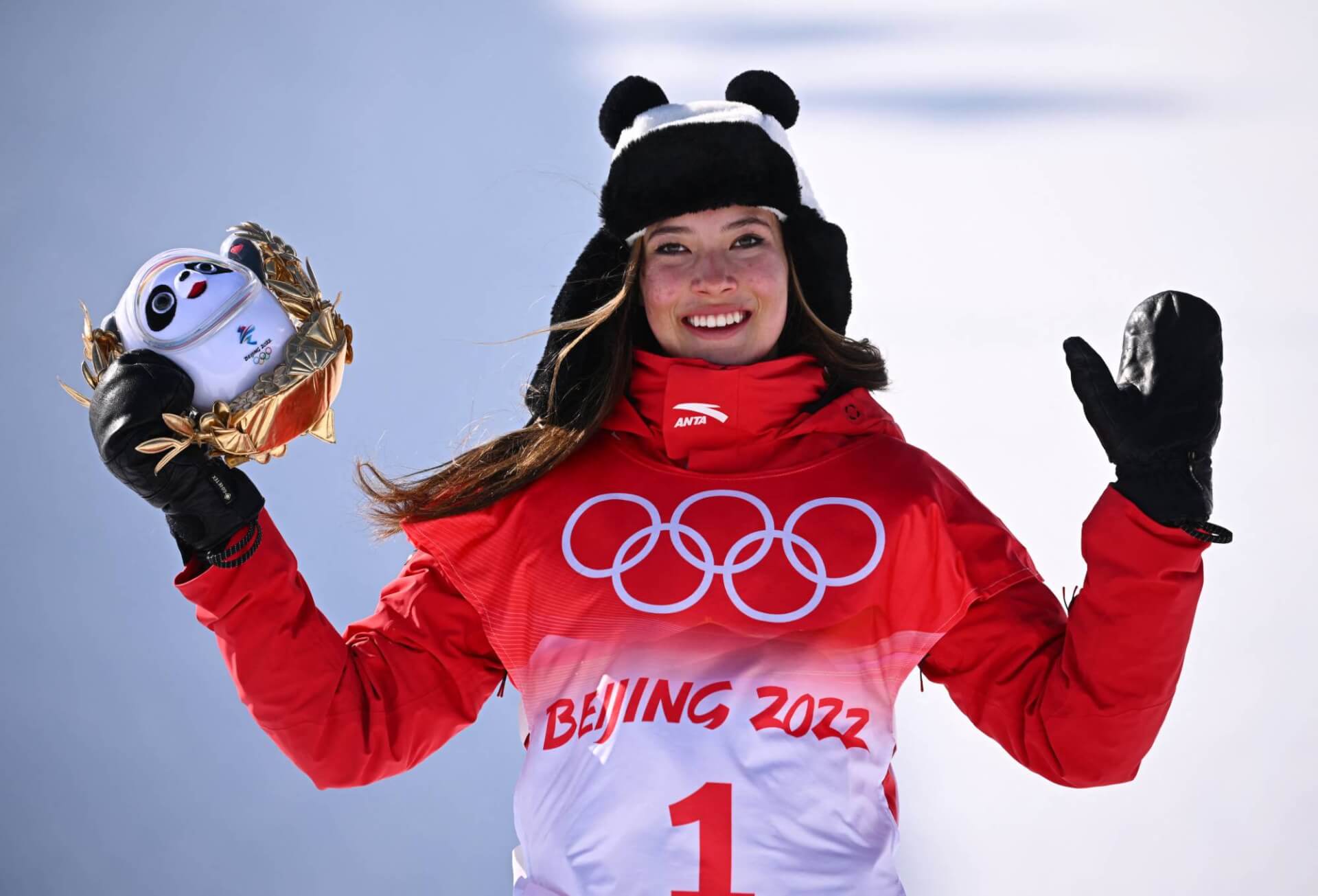China’s largest-ever contingent of foreign-born athletes took part in the Beijing Winter Olympics this year. Of the 176 members in its delegation, 30 were born and raised abroad. Most of them have Chinese ancestry and at least half are based in North America. In its ploy to maximise its medal count and showcase the inclusive nature of its diverse society, however, China has instead inadvertently shed unwanted light on its complicated definition of national identity and what it means to be Chinese.
The zenith of this inclusiveness is demonstrated by the example of the American-born freeskier Eileen Gu, who has both American and Chinese heritage. At the tender age of 15, Gu made the life-altering decision to represent China instead of her birth country. Her unique career move was highlighted by her record-breaking performance at the women’s freeskiing events this year, which won China two gold medals and one silver.
Gu’s victories made her an overnight sensation in China, with Chinese media, who refer to the athlete by her Chinese name Gu Ailing, hailing her as the country’s “Snow Princess.” For several days during the Olympics, her name trended on the Chinese social media platform Weibo, which eventually crashed after her wins due to the exorbitant number of users searching her name.
Gu’s instant fame and heritage have also secured her a lucrative side career in modelling in China. As of 2021, Gu has been the face of at least 23 global luxury brands, including Estée Lauder, Cadillac, Louis Vuitton, Tiffany & Co, Victoria’s Secret, and the Bank of China. The estimated income from her modelling stints amounts to a whopping 200 million yuan ($31.4 million).
These high-end deals that have put the mixed-race athlete on every billboard in China have been interpreted and advertised by some as a reflection of the accepting and inclusive nature of Chinese society and the expanding definition of national identity.
For you, Grandma!💕 #EileenGu gave her first gold medal🏅 🪙to her grandmother and received her second gold medal🏅 wearing her grandmother's #panda🐼 hat. #BEIJING2022pic.twitter.com/WbjbVWmY3S
— Zhang Meifang张美芳 (@CGMeifangZhang) February 18, 2022
Gu’s popularity among locals is further cemented by her cultural fluency. The eighteen-year-old speaks fluent Mandarin with a Beijing accent, courtesy of her Chinese-born mother, and has spent considerable time in the country while growing up. When asked about her identity and nationalism during press conferences, Gu has simply stated: “When I’m in China, I’m Chinese.”
Gu has further profited in her new land of opportunities by appeasing its highest gatekeeper, the Communist Party of China (CPC). By remaining tight-lipped on sensitive issues such as Peng Shuai, human rights, the ‘One China’ principle, and her citizenship status (and accompanied by her gold-plated career), the American-born skier has hit the nail on the head when it comes to succeeding in China. Interestingly, while competing in the US, Gu has a history of being vocal about social causes such as the Black Lives Matter movement and anti-Asian hate.
Yet, Eileen Gu’s experience as the darling and posterchild of Chinese society is in stark contrast to the experiences and public perception of other foreign-born athletes of Chinese origin, who have had less luck in gaining acceptance from a supposedly inclusive society, either by the media or the masses.
When Nathan Chen, a Chinese-origin figure skater representing the US won a gold medal in the men’s singles category, Chinese state media essentially overlooked his achievement. Instead, the Utah native, who speaks only limited Mandarin, became the target of heavy criticism by Chinese netizens, who blasted the skater for being a “traitor.” Chen, whose parents met in Beijing, has even been called “too white” and been told to “get out of China” on Weibo.
You're a Rocket Man, @nathanwchen! 🚀⛸️
— Olympics (@Olympics) February 26, 2022
Nathan Chen is now an Olympic champion after a stellar free program performance at #Beijing2022. 🥇 pic.twitter.com/LcybUl3Qdl
Moreover, this treatment has not only been reserved for Chinese-born and origin athletes representing the US. California-born skater Beverly Zhu, whose story has several similarities with Elieen Gu’s, did not get the oversized, enthusiastic support from her Chinese fans that Gu did. Like Gu, Zhu is a teenage athlete who goes by her Chinese name Zhu Yi in China and made her first appearance for China in this year’s Winter Olympics. However, after stumbling on the ice, the hashtag #ZhuYiFellDown was viewed more than 200 million times on Weibo. Users attacked the skater, who has given up her US citizenship to be able to compete for China, for her inability to speak fluent Mandarin and asked her to “go back to America.”
The scathing online attacks referred to Zhu as “shameless,” “rotten,” and an “embarrassment,” and baselessly alleged that she was occupying a position that could have instead gone to a Chinese-born athlete. In fact, in an unusual move for the company, Weibo had to step in within a few hours to shut down the hashtag.
This dichotomy has laid bare the impossibly high standards that those who are not considered ’Chinese’ are held to, wherein those who fall foul of these standards are actively shamed and made to feel unwelcome. Those who are celebrated, like Eileen Gu, are not only expected to display high levels of performance and athletic prowess but also required to reshape their identities to fit the mould of a highly restrictive Chinese society and government.
For instance, while commenting on internet censorship in China in an Instagram post, Gu boasted that it was easy to dodge the Great Firewall through a simple, “free” VPN. The CPC’s displeasure at the remark was clear, as her comment, which could be interpreted as disloyalty to China and disapproval of government policies, vanished soon after.
🇨🇳 China 'snow princess' Eileen Gu's dominant win in the halfpipe at #Beijing2022 added to the country's best ever #gold medal tally at a Winter #Olympics, with #freestyleskiing accounting for half of the hosts' podium-topping finishes https://t.co/KDxI9PwfIT pic.twitter.com/ZMKsvRkMsq
— Reuters (@Reuters) February 18, 2022

